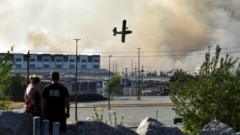Is Canada’s Safetyism Overreacting by Banning Woodlands Access Due to Wildfire Risks?

Understanding Nova Scotia's Wildfire Restrictions: A Balancing Act Between Safety and Rights
The recent bans imposed by the Canadian province of Nova Scotia have sparked intense debates about personal freedoms and public safety. As the province grapples with one of its worst wildfire seasons on record, Premier Tim Houston's government has enacted sweeping restrictions to mitigate fire risks. These measures, however, have faced fierce criticism from residents and advocacy groups, who label them as "draconian." This article explores the reasons behind these restrictions, their implications, and the broader context of wildfires in Canada.
The Context of Wildfires in Nova Scotia
Nova Scotia's wildfires are not an isolated issue but part of a broader trend observed across Canada. In recent years, the country has witnessed increasingly severe wildfire seasons, attributed in part to climate change. The Intergovernmental Panel on Climate Change (IPCC) has noted that climate change is making conditions more favorable for wildfires to ignite and spread. As of the summer of 2025, Nova Scotia's wildfire season is already the second worst on record, following the catastrophic season of 2023.
Statistics and Severity of the Current Wildfire Season
This year, more than 470 wildfires are reported as "out of control" across Canada, with Nova Scotia bearing a significant burden. According to statistics from 2009, approximately 97% of wildfires are caused by human activity, which has prompted officials to take drastic measures. During the past week alone, the province has experienced an average of two fires daily, underscoring the urgency of the situation.
Details of the Restrictions
In response to the escalating fire threat, Nova Scotia has implemented a ban on hiking, fishing, and the use of vehicles like ATVs in wooded areas. Violators face hefty fines of up to C$25,000 (approximately $18,000). The government has even established a tip line for residents to report any breaches of these rules. Premier Houston has emphasized the seriousness of the situation by stating, "It's just too serious of a situation by now."
Public Reaction and Controversy
The reaction to these restrictions has been mixed. While some residents and commentators support the measures as necessary precautions, others view them as an infringement of personal freedoms. The Canadian Constitution Foundation has voiced concerns about what it terms "creeping authoritarianism," arguing that such bans set a dangerous precedent for future governance in Canada.
The Case of Jeff Evely
One of the most notable stories arising from this controversy is that of Jeff Evely, a military veteran who publicly challenged the ban. Evely recorded a video of himself entering a Department of Natural Resources office to contest the ban in court, stating that he needed to receive a fine to pursue legal action. His actions have sparked discussions about civil liberties and the right to protest against government regulations.
Support for the Restrictions
Despite the backlash, many Nova Scotians understand the need for such drastic measures. Political journalist Stephen Maher wrote in an opinion piece that while his own activities in the woods are unlikely to cause a fire, the ban is necessary to protect the community from those who may act carelessly. Former Conservative Party campaign manager Fred DeLorey echoed similar sentiments, stating that he welcomed the ban as a responsible reaction to the extreme fire risk.
Comparative Measures in Other Provinces
Nova Scotia is not the only province grappling with wildfire risks. New Brunswick and Newfoundland and Labrador have implemented similar restrictions, including bans on off-road vehicles in forested areas and fines reaching C$150,000 for violations. These collective actions demonstrate a regional response to an escalating crisis.
Emergency Response and Resources
In light of the severity of the current wildfire season, emergency services in Nova Scotia, New Brunswick, and Newfoundland and Labrador have ramped up their efforts. Military and coast guard units have been deployed to assist in firefighting efforts. This coordinated response highlights the urgency of the situation and the need for robust measures to protect both people and the environment.
Climate Change and Its Role in Wildfire Intensity
Understanding the role of climate change in the increasing frequency and intensity of wildfires is crucial. While wildfires can occur naturally, human activity is a significant contributor to their occurrence. The IPCC has confirmed that climate change is affecting weather patterns, leading to hotter, drier conditions that are conducive to wildfires. Together with human negligence, these factors create a perfect storm for wildfire outbreaks.
Long-term Strategies for Wildfire Management
As wildfires continue to pose a threat, addressing the underlying issues will require a multi-faceted approach. This includes:
- Improved land management practices to reduce fuel loads in forests.
- Enhanced community education about fire safety and responsible land use.
- Investment in firefighting infrastructure and resources.
- Collaboration across provincial and federal agencies to develop comprehensive wildfire response strategies.
Conclusion: A Call for Balanced Solutions
The current wildfire crisis in Nova Scotia raises important questions about how to balance public safety with personal freedoms. As Premier Tim Houston noted, the province is currently in a precarious situation, and the restrictions may only be temporary until conditions improve. Advocates for civil liberties urge that any measures taken should be carefully considered to avoid overreach. The ongoing dialogue surrounding these restrictions will likely shape future policies related to wildfire management and community safety.
FAQs
What are the new restrictions in Nova Scotia regarding wildfires?
Nova Scotia has banned hiking, fishing, and the use of vehicles like ATVs in wooded areas to mitigate wildfire risks. Violators may face fines up to C$25,000.
Why are these restrictions being enforced now?
The restrictions are a response to extremely dry conditions and an alarming increase in wildfires, with human activity responsible for nearly all occurrences in the province.
How is the government responding to the wildfire crisis?
The government has deployed military and coast guard units for firefighting efforts and established tip lines for reporting violations of the bans.
What are the implications of these restrictions on personal freedoms?
Many residents and advocacy groups have expressed concern that the bans infringe on personal freedoms and represent a slippery slope toward increased governmental control.
What role does climate change play in the wildfire crisis?
Climate change has been identified as a significant factor contributing to the increasing frequency and intensity of wildfires, as it creates hotter and drier conditions conducive to fire outbreaks.
As Nova Scotia navigates these challenging times, the balance between safety and civil liberties remains a contentious topic. How can we effectively prepare for future wildfire seasons while respecting individual rights? #WildfireAwareness #NovaScotia #ClimateChange
Published: 2025-08-13 23:00:20 | Category: wales



